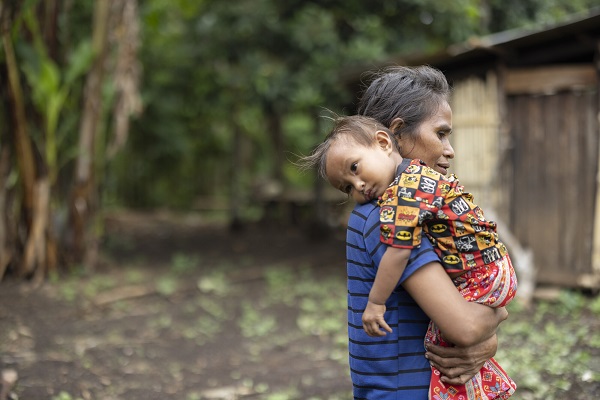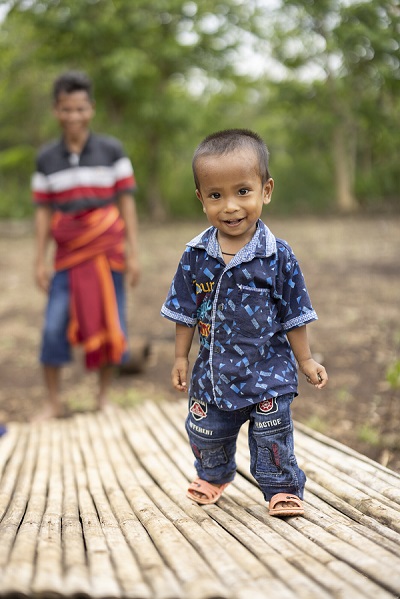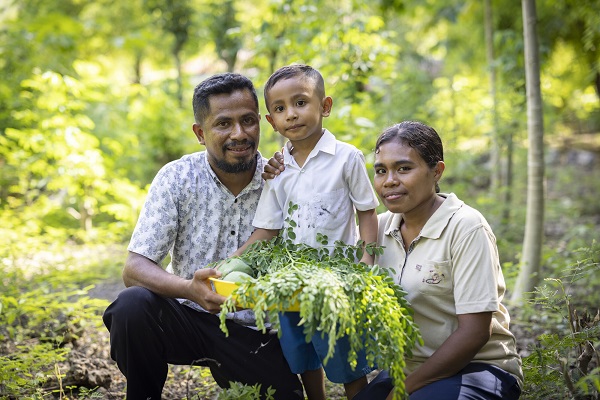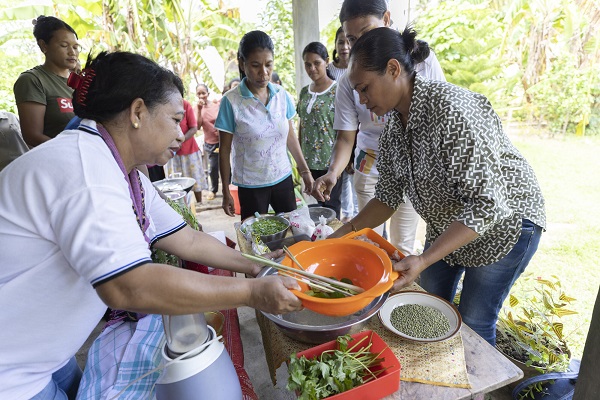Site will be
unavailable for maintenance from June. 4, 11:30 p.m., to June 5, 12:30 a.m. ET. Thank you for your
patience!
Food inflation is a growing threat to children worldwide. Here’s how we fight hunger – by bringing parents together.
Posted on 01/09/2024
“She had no energy. She was very thin. She was malnourished because I could not afford to buy good food for her,” says Debora, mom of 18-month-old Maria.
Mother and daughter live on the island of Sumba in East Nusa Tenggara Province, Indonesia, which has been especially hard hit in recent years by soaring food prices. Debora recalls feeling hopeless.
“At that time, I was hoping Maria would survive. Another child in the village had just died because of malnutrition.”
 Debora with her daughter, Maria.
Debora with her daughter, Maria.
Their situation is not uncommon. Food inflation has soared in the years since the COVID pandemic. And while global inflation seems to be stabilizing, food and energy prices, which are not included in the core inflation calculation, continue to soar to double- or even triple-digit inflation rates.
The world’s low-income countries are by far the most affected by skyrocketing food prices. What’s more, during the first half of 2023, the main contributors to food inflation worldwide were edible oils and fats, bread and cereals, and dairy and related products – nutrition essentials for growing bodies and minds. Higher prices on foods like these mean decreased purchasing power for parents with young children. Fewer families can afford even two meals a day, let alone protein-rich, nutritious food. Malnutrition is on the rise in places like Sumba, impairing children’s ability to learn and grow.
Fighting malnutrition through responsive parenting groups
ChildFund is working with parents and children in the region in multiple ways. For one, ChildFund’s local partner organization in the community, Sumba Integrated Development, is helping facilitate ChildFund’s responsive parenting classes in the community. Here, parents learn about proper sanitation and hygiene practices at home, the importance of play and communication, and how to cook healthy, nutritious meals with foods that will grow in their gardens.
The classes have been a game-changer for Debora and little Maria, who is now recovering from severe acute malnutrition.
“I want to continue to go to these parenting classes until Maria grows up,” Debora says. “Maria looks so much happier than my older children. I wish I had that knowledge earlier in life.”
Dorcas, another mom in the program, is also happy to have discovered ChildFund when she did. Her son Natanial was diagnosed with malnutrition at five months old. It was mostly because Dorcas herself wasn’t getting the nutrition she needed to properly breastfeed. At a time in Natanial’s life when he should be bursting with energy, he was growing thinner, more lethargic and often feverish.
Like many families on Sumba Island, Natanial’s family makes their living as farmers, raising corn, rice, taro root, cassava and bananas on their small plot of land. They lack a clean water source, drawing their water from a nearby stream. The family eats twice daily with what they can harvest from the garden. Sometimes, when sales at the market are good, they can afford to buy eggs. “I feel bad because I cannot afford to buy good food for my family,” says Lukas, Natanial’s father.
For the last year, Lukas and Dorcas have been attending the responsive caregiving sessions in their community after being referred by the health center where Natanial receives care. In the classes, they’re learning how to source healthy ingredients that grow right within their community, like moringa and cassava leaf, to supplement the foods that they feed their children each day.
After nearly a year of his parents attending the sessions and implementing the shared knowledge, Natanial’s weight and growth have improved. He is no longer frail and sickly, though he has not yet achieved a normal growth rate.
 2-year-old Natanial.
2-year-old Natanial.
On the nearby island of Timor, another of ChildFund’s local partner organizations, Yayasan Cita Masyarakat Madani, also conducts responsive parenting classes. Children sometimes attend with their parents, especially during practical cooking demonstrations, in which a community facilitator works together with mothers and fathers to cook a big, healthy meal from scratch. Afterward, everyone shares the meal they cooked together.
Juan, 4, is just one child who has benefited from the program. His parents, Yunus and Paulina, make their living as teachers in a rural part of the island. As busy first-time parents, they lacked knowledge on proper nutrition and food preparation for their household.
 Juan and his parents hold a basket of freshly harvested moringa leaves and papaya fruit in their garden.
Juan and his parents hold a basket of freshly harvested moringa leaves and papaya fruit in their garden.
When Juan was weaned at about 8 months old, his health and weight began to steadily decline for the next two years. He was plagued with regular episodes of fever and vomiting. “Juan was not like you see today, not like normal children whose bodies are strong and fit,” remembers Yunus. “His body was like skin and bones.”
At one point, Juan’s parents took him to the health center four times in a single month, not fully knowing what the cause of his health problems were. “As parents, we had to find out why our child was constantly ill every month …. Every month we sent him to the health center, and every time, we saw that his weight did not increase. We as parents thought, ‘How can this be – that his weight is stuck at 8 kilograms, 8 kilograms, while all along he is getting older?’”
While health care professionals were able to diagnose Juan with severe acute malnutrition, his parents were not receiving practical instruction on proper nutrition and the best foods to feed Juan to get him to a healthy weight. “We used to give him only porridge without moringa or other vegetables,” recalls Yunus.
 Moms attend a cooking demonstration led by facilitator Meli Tobin.
Moms attend a cooking demonstration led by facilitator Meli Tobin.
One of the volunteers at the local health center eventually connected Yunus and Paulina to Yayasan Cita Masyarakat Madani. Yunus and Paulina began to attend YCMM’s responsive parenting classes where – among other skills – they learned how to source affordable, healthy ingredients to supplement the foods that they feed Juan each day. Juan would sometimes attend with them, especially during the practical cooking demonstrations.
“The facilitators at the responsive parenting classes told us about good food for our children, healthy food such as moringa, cassava leaves, and papaya – all foods that grow locally,” says Yunus.
Sure enough, as Yunus and Paulina practiced these cooking tips back home, Juan’s growth and health began to improve so that by the time he turned 3 years old, constant trips to the health center were no longer necessary.
“With the cooking demonstrations, our children’s weight and height have increased, and malnutrition in [our community] has decreased. And even the staff at the health center no longer scold us on why our child’s weight is stuck at 8 kilograms.”
At just shy of 5 years old, Juan’s weight, height and growth – not to mention energy levels – are now where they should be for a child his age: “Every day I am with Juan, I see now how active he is, super-active, cheerful,” Yunus says. “And when he goes to school and then comes back home, he proudly tells me, ‘Dad, today we learned to draw.’ ‘Dad, today we learned to count.’ ‘Dad, today we exercised.’ … And as parents, we feel very grateful because he is now growing and developing well.”
How to fight malnutrition
In Indonesia and around the world, food inflation is a growing threat to children – but together, we can help make sure all kids get the nutrition they need to grow up healthy and strong. Donate to fuel our parent-focused nutrition programs in 2024, or sponsor a child who may be in need of support getting regular meals this year.
Loading...

